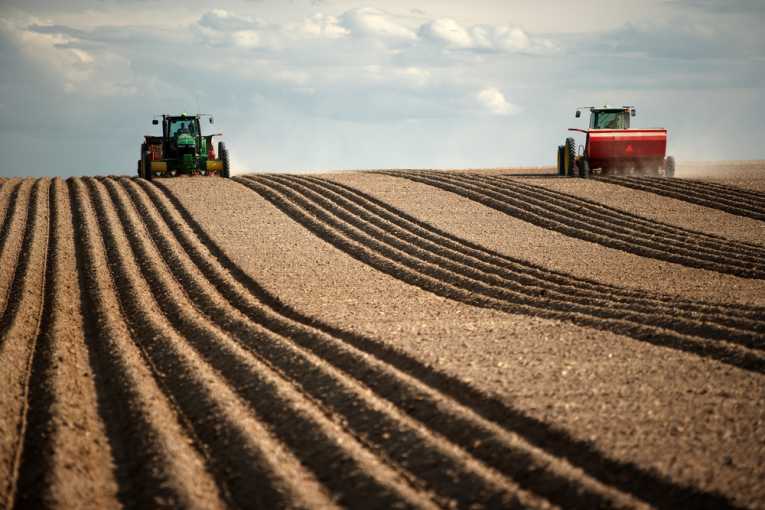A panel of scientists are arguing for a complete reorganisation of how we deal with food and agriculture to deal with the challenge climate change poses to food security. Using the UN's climate talks in South Africa this month as their launch pad, the independent panel make seven recommendations for a new food system.
With the population rocketing upwards and set to hit 9 billion by 2050 demand for food will grow with it while climate change is putting pressure on the environmental systems we all rely on. Agriculture is putting vital ecosystems under threat and farming methods threaten biodiversity, the fertility of our soils and the availability of water.
In the face of these changes, after looking at current research, the commission is calling for urgent global action to protect food supplies and the environment.
The commission's chair, Professor Sir John Beddington, the chief scientific adviser to the UK Government, said: "It's about reorienting the whole global food system - not just agricultural production, and not just in developing countries. We need a socially equitable, global approach to produce the funding, policy, management and regional initiatives that will deliver nutrition, income and climate benefits for all."
The group has released a policy document which they hope will influence talks at the UN Climate Conference in Durban which meets from November 28 to December 9, prior to the 20th anniversary revisiting of the Rio Earth Summit.
A final report will be issued next year, and members of the commission say they offer a detailed and research-based set of proposals which are vital to tackling climate change while feeding the planet.
The seven headline initiatives from the commission are:
To make both food security and agricultural sustainability national and global policy priorities.
To spend on building sustainable farming and food supply.
To make agriculture less of a contributor to climate change while increasing sustainable production.
To give the most help to those who are at greatest risk from changing climate conditions and food shortages.
To change the way we eat and access our food so that everyone's nutritional needs are met and all societies eat healthily and sustainably.
To stop wasting food at all stages of food production and consumption.
To provide information on human nutrition and ecosystems that is integrated and can inform policy making.
The problem is an enormous one. More than a billion suffer from malnutrition, while in rich countries obesity and other diseases of over consumption cause misery to millions. And, the current trends are all in the wrong direction, with demand for animal products, fats and calories growing and pushing prices up. The growing biofuel industry also puts a strain on agricultural land. Shortages and food insecurity is likely to lead to conflict.
Climate change threatens agricultural systems already and the disastrous extreme weather events it brings will further threaten those who live close to the edge of hunger already.
Everyone will need to act, argues the commission, from producers to governments to consumers.
"There is no one-size-fits-all solution," said Commission Vice-Chair Dr Mohammed Asaduzzaman, who is Research Director at the Bangladesh Institute of Development Studies, "but we know that success depends on a combination of investment, innovation and deliberate effort to empower the world's most vulnerable populations."
While much of the world's population struggles to get enough to meet their most basic needs, around 33% of the food produced is wasted, lost or thrown away. The way we produce food is massively inefficient yet, it is, says the commission the sector which contributes the most greenhouse gas pollution. Both of these unpalatable facts must change says the commission, which calculates that 12 million hectares of farming land - and around 20 million tonnes of grain - are lost to food production by degradation.
Human catastrophes like the famines currently afflicting the Horn of Africa show how vulnerable some people are to extreme weather and food price hikes. Whole societies need to change not just food production argues the commission - Dr Rita Sharma, Secretary of India's National Advisory Council says that a rural employment scheme in her country provides an economic hedge against disaster for previously vulnerable populations.
All these changes need to be informed by a thorough system of scientific monitoring.
"If we are armed with real-time, spatially explicit information about land uses, markets and human populations, we can do a much better job of meeting our needs and taking care of the planet," said Commissioner Dr Carlos Nobre of the Brazilian Ministry of Science, Technology and Innovation. "This means better capacity to forecast crises as well as testing specific interventions and scaling up the ones that work."
The time to act is now says the commission. Governments and world organisations need to make food security and the sustainability of farming a major policy priority - pushing agriculture up the RIO+20 agenda would be a good first step they say. And, money needs to follow good intentions with major investment in food security and sustainable farming.
You can find out more via The Commission on Sustainable Agriculture and Climate Change.










